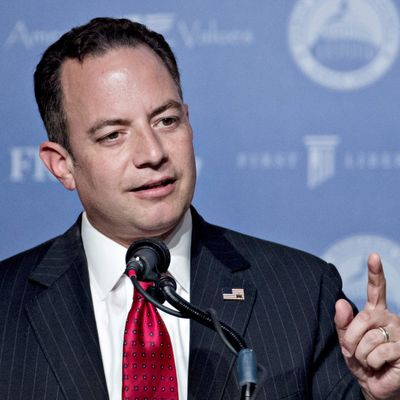
One of the heresies against conservative orthodoxy that Donald Trump committed in the 2016 presidential nominating contest was to criticize the widely shared commitment to “entitlement reform,” a euphemism for spending cuts or structural changes designed to reduce the cost of Social Security, Medicare, and Medicaid. Trump actually didn’t discuss it often or in much detail; Republicans typically downplay public discussion of this subject since entitlement reform, especially when it involves the universally available Social Security and Medicare retirement programs, is very unpopular among GOP, as well as Democratic and independent, voters. But on the campaign trail Trump did make it reasonably clear he thought the mega-growth his economic polices would allegedly produce would keep Social Security and Medicare solvent without big changes in either program.
Trump sometimes included Medicaid as well as Social Security and Medicare in the list of entitlements he did not want to touch. But we can probably disregard any assurances on that program, since you cannot repeal the Affordable Care Act without tampering with the Medicaid expansion that has been the source of much of the ACA’s coverage expansion. In addition, Trump’s sketchy health-care platform included a proposal to turn Medicaid into a block grant wherein states would call the shots in exchange for a fixed (and probably shrinking) federal grant, which, needless to say, would represent a big change. So while Democrats will throw Trump’s occasional words about protecting Medicaid back at him whenever possible, the real drama involves Social Security and Medicare, the programs that also most affect Trump voters.
And whatever he said as a candidate, there is no question Trump has surrounded himself with politicians and opinion leaders who would go after both the big entitlement programs for the elderly with a clawhammer if given the opportunity. His vice-president, Mike Pence, was a big-league entitlement reformer in Congress. So, too, were the two men who will be most intimately involved in the administration’s legislative agenda in this area, his appointees as OMB director, Mick Mulvaney, and HHS Secretary, Tom Price. And the administration’s most important partner in Congress, House Speaker Paul Ryan, has repeatedly proposed to change Medicare from a defined benefit program to a system of subsidies for the purchase of private health insurance — a “reform” nearly every Republican who has served in Congress in recent years has voted for at one time or the other. Ryan was also a big fan of George W. Bush’s proposal to partially privatize Social Security.
Unsurprisingly, despite Trump’s earlier vague assurances, there has been renewed talk of entitlement reform — especially with respect to Medicare (Medicaid cuts are simply assumed) — taking a big step forward now that Republicans control Congress and the White House, probably in a second budget bill later this year after the Obamacare repeal has been enacted, assuming that happens on schedule.
But Trump’s White House chief of staff and former RNC chairman Reince Priebus reset everybody’s expectations yesterday:
Incoming White House Chief of Staff Reince Priebus on Sunday suggested President-elect Donald Trump stands by his campaign vow not to cut Medicare.
“I don’t think President-elect Trump wants to meddle with Medicare or Social Security,” Priebus said on CBS’s “Face The Nation.”
“He made a promise in the campaign that that was something that he didn’t want to do.”
Thus Priebus is confirming that Trump’s comments during the campaign represented a promise. And he interpreted the promise as ruling out meddling, not just “cuts,” which would appear to take off the table Ryan-style Medicare reforms that cut benefits indirectly over time.
Notably, Priebus did not mention Medicaid at all.
So does that mean seniors worried about Social Security and Medicare can relax for the moment? And is Trump, through his chief of staff, letting Democrats know they won’t be able to mobilize opposition to the administration’s entire agenda based on Medicare reform?
Probably, but one statement on one Sunday show is not definitive. Let’s say for the sake of argument that at some point this fall Trump is presented with a large budget-reconciliation bill that includes big, fat, juicy tax cuts, new funding for the Pentagon, and maybe even some semblance of the mogul’s infrastructure investment plan — and, oh yeah, nestled in the fine print, a step toward Medicare vouchers. Is he going to veto the whole thing to protect Medicare? Or will he shrug and say that while he didn’t want to meddle with Medicare, Congress did, and we all have to make some concessions to make America great again.
You can be sure that Democrats won’t wait around for a nasty little surprise like that to appear. This very week, when the bare-bones budget resolution designed to authorize an Obamacare repeal reaches the Senate floor, they will have a brief opportunity to offer unlimited amendments in what is known as a “vote-a-rama.” There is no question one of those amendments will rule out Social Security and Medicare cuts as part of the subsequent budget reconciliation bill. With the president-elect’s chief of staff having disclaimed any intention of going after these programs, why would Senate Republicans vote to expose themselves to the heat Democrats would succeed in generating if they are indeed left on the table? The odds are pretty good they’ll instead just cave, at least for the time being.
Republicans will never completely relinquish their desire to get long-delayed revenge on the ghosts of Franklin Roosevelt and Lyndon Johnson by killing, gutting, or seriously restructuring New Deal and Great Society programs like Social Security and Medicare. But ideally they want bipartisan cover for entitlement reform, which is why Republicans always include it in the occasional “grand bargain” budget proposal. And they sure won’t run the risk of a major senior backlash if their own president is not onboard. So unless Priebus was just speaking out of turn, his remarks will probably preclude big Social Security and Medicare changes this year.






























